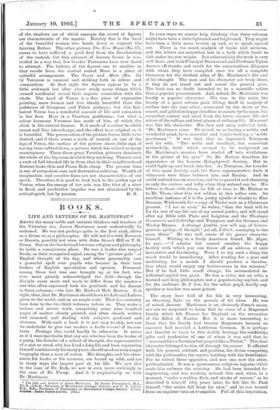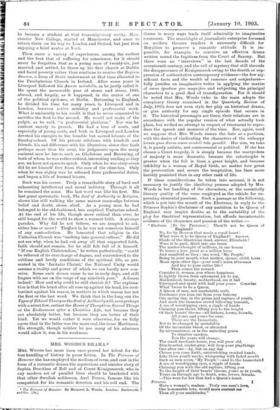BOOKS.
LIFE AND LETTERS OF DR. MARTINEAU.*
AMONG the many noble and eminent thinkers and teachers of the Victorian era, James Martineau must undoubtedly be reckoned. He was not perhaps quite in the first rank, either as a divine or as a philosopher. He will not live with Newman or Darwin, possibly not even with John Stuart Mill or T. H. Green. But on the borderland between religion and philosophy he holds a conspicuous place. He was a leader who ranged freely, as their recognised equal, among the " greater gods " of English thought of his day, and whose personality cast a powerful spell over pupils who became in their turn leaders of English speculation and opinion. Foremost among these last was one brought up at his feet, who ever most piously acknowledged the debt—though the disciple came more and more to differ from the master— and who often expressed both his gratitude and his dissent in these columns,—the late Mr. Richard Holt Hutton. It is right, then, that Dr. Martineau should have his Life and Letters given. to the world, and on an ample scale. That has certainly been done in the two thick volumes before us. They make a serious and severe work, comprising some nine hundred pages of matter closely printed, and often closely written and reasoned, and dealing with subjects profound and abstruse. With such a book it is not easy to skip, nor can we undertake to give our readers a facile resume of its con- tents. Perhaps this could hardly he otherwise. It seems as if it were inevitable that any one who has been the leader of a party, the founder of a school of thought, the representative of a sect or creed, who has lived a long life and been expressing himself continuously for many years, should need an even longer biography than a man of action. His thoughts and his utter- ances, his books or his sermons, are bound up with, and are in many ways the largest part of, his life. We saw this in the case of Dr. Dale, we saw it even more strikingly in the case of Dr. Pusey. And it is emphatically so with Dr. Martineau.
• The Life and Lettere of James Martineau. By James Drummond, M.A., LL.D., Litt.D., Principal of Manchester College, Oxford; and C. B. Upton, B.A., B.Sc., Professor of Philosophy in Manchester College, Oxford. 2 vols. London: James Nisbet and Co. 130s.)
In some ways we cannot help thinking that these volumes might have been a little lightened and brightened. They might have been a little more broken up and, so to speak, spaced out. There is too much analysis of hooks and sermons, and the letters are somewhat lost in a bulk which tends to sink under its own weight. But substantially the work is very well done, and both Principal Drummond and Professor Upton deserve all thanks and credit for the conscientious diligence with which they have compiled once for all a complete thesaurus for the student alike of Dr. Martineau's life and of his thought. The man and his character are truly there, if they do not stand out and arrest the general gaze. The book was no doubt intended to be a scientific rather than a popular presentment. And, indeed, Dr. Martineau was hardly a popular character. His was, in the main, the beauty of a great solemn peak lifting itself in majesty of outline into the rare ether, crimsoned by the dawn or the sunset, and gilded in happy cloudless moments by the noon. but somewhat austere and aloof from the lower, warmer life and colour of the valleys and level places of ordinary life. His creed was like his character. His face and mien reflected both. "Dr. Martineau came. He struck us as having a subtle and wonderful mind, he is mournful and tender-looking, a `noble gentleman.' " It was thus that he impressed Tennyson and his wife. " The noble and steadfast., but somewhat melancholy, faith which seemed to be sculptured on Dr. Martineau's massive brow shaded off into wistfulness in the glance of his eyes." So Mr. Hutton describes his appearance at the famous Metaphysical Society. But he could light up and break into fire. As Tennyson, the founder of this same Society, said, the finest argumentative duels it witnessed were those between him and Huxley. And he could unbend too on occasion, and be as graceful and charming as only the austere and lofty when they unbend can be. His letters to those with whom be felt at ease, to Mr. Hutton or to Mr. Thom, show him not seldom in this softer vein. An excellent instance of it is the pretty epistle of thanks to Miss Susanna Winkworth for a copy of Tauler sent as a Christmas present. "I see at once," he writes, "that the book will be for the rest of my life one of my sacred guides, and will stand after my Bible with Plato and Leighton and the Theologia Gerrnanica and Coleridge and Tennyson, and the German and Wesley Hymns. A strange jumble, you will say, of hetero- geneous springs of thought ! yet all, I think, assuaging to the same thirst." He was well aware of his graver character himself. Writing to a lively American friend, Mr. Alger, he says :—" I admire but cannot emulate the happy facility with which you can throw off an address, at once instructive and fascinating. Were I to try such a thing the result would be humiliating. After reading for a year and meditating for a month I should produce a lucubra- tion which would empty any lecture-room in ten minutes." But if he had little small change, his accumulated in- tellectual capital was great. He was a voice, not an echo, a learned and deep philosopher, not a popularising sophist, and for the audience fit if few, for the select pupil, hardly any speaker or teacher was more potent.
The story here told of his life is very interesting, as throwing light on the genesis of his ideas. He was of mixed descent. Martineau is an obviously French name, nor are we surprised to learn that he came of a Huguenot family which left France for England on the revocation of the Edict of Nantes. But it is more interesting to learn that his family had become Huguenots because an ancestor had married a. Lutheran German. It is perhaps not fanciful to trace to this double heritage the conflicting gifts and tendencies of one of whom it was said that he " reasoned like a Socinian but prayed like a Pietist." This dual character belonged to him all through his career. It affected both his general attitude and position, the divine competing with the philosopher, the mystic battling with the freethinker For he united these opposites, and now one, now the other, predominated. It was a spontaneous religious impulse which made him embrace the ministry. He had been intended for engineering, and was working toward this end, when, in a moment, "under a sudden flash and stroke of sorrow," as be described it himself fifty years later, he felt like St. Paul himself, "the scales fell from his eyes," and he was turned from an engineer into an evangelist. Full of this inspiration,
he became a student at that transmigratory entity, Man- chester New College, started at Manchester, and anon to return there on its way to London and Oxford, but just then enjoying a brief avatar at York.
Then came a variety of -experiences, among the earliest and the best that of suffering for conscience, for it should never be forgotten that as a young man of twenty-six, just married and settled, he threw up his first church at Dublin and faced poverty rather than continue to receive the Regium Donum, a form of State endowment at that time allocated to the Presbyterian Church in Ireland. After some years in Liverpool followed his Annus mirabilis, as he justly called it. He spent the memorable year of storm and stress, 1848, abroad, and largely, as it happened, in the centre of one of the political cyclones, at Berlin. Returning to England, he divided his time for many years, in Liverpool and in London, between active ministry and professorial work. What is eminently to his credit is that be never consented to sacrifice the first to the second. He would not make of the pulpit, as he said, "a professorial platform." Nor was he content merely to preach. He had a love of souls, and especially of young souls, and both in Liverpool and London devoted his energies to the humble but sacred labours of the Sunday-school. Of his private relations with kinsfolk and friends, his sad difference with his illustrious sister (her fault perhaps more than his own), his judgments upon the many eminent men he knew, such as Gladstone and Browning, of both of whom he was rather critical, interesting reading as they are, we have not space to speak. Only when he was sixty-seven did he set himself free from the care of the churches. Only when he was eighty was be released from professorial duties, and began a life of learned leisure.
Such was his career. Truly a remarkable story of hard and exhausting intellectual and moral industry. Through it all he remained the same. His last word was like his first. His last great systematic book, The Seat of Authority in Religion, shows him still walking the same narrow razor-edge between belief and doubt, alone, aloof. As a young man he had belonged to the old-fashioned, less sceptical Unitarian school. At the end of his life, though more critical than ever, he still longed for the world to show a warmer faith. A strange paradox. Why did he not believe, we are tempted to ask, either less or more ? Thelfact is, he was not conscious himself of any contradiction. He lamented that religion in the Unitarian Church was "melting into general culture." He did not see why, when he had cut away all that supported faith, faith should not remain, for he still felt full of it himself. " If our English Christendom," he writes pathetically, " could be relieved of its overcharge of dogma, and surrendered to the sublime and lovely conditions of the spiritual life, as pre- sented in the Imitatio Christi,' the National Unity would assume a reality and power of which we can hardly now con- ceive. Soma such dream came to me in early days, and still lingers with me on the verge of my ninetieth year." A dream indeed! How and why could he still cherish it? The explana- tion is that his heart after all rose up against his head, his root- instinct against his reason, in matters in which reason has not the first or the last word. We think that in the long run the Types of Ethical Theory or the Seat of Authority will, save perhaps with a select few, outlast the Hours of Thought on Sacred Things or the Endeavours after a Christian Life, not because they are absolutely better, but because they are better of their kind. Yet we would rather it were otherwise, for we fully agree that in the latter was the more real, the truer Martineau. His strength, though neither he nor many of his admirers would allow it, was in his weakness.







































 Previous page
Previous page